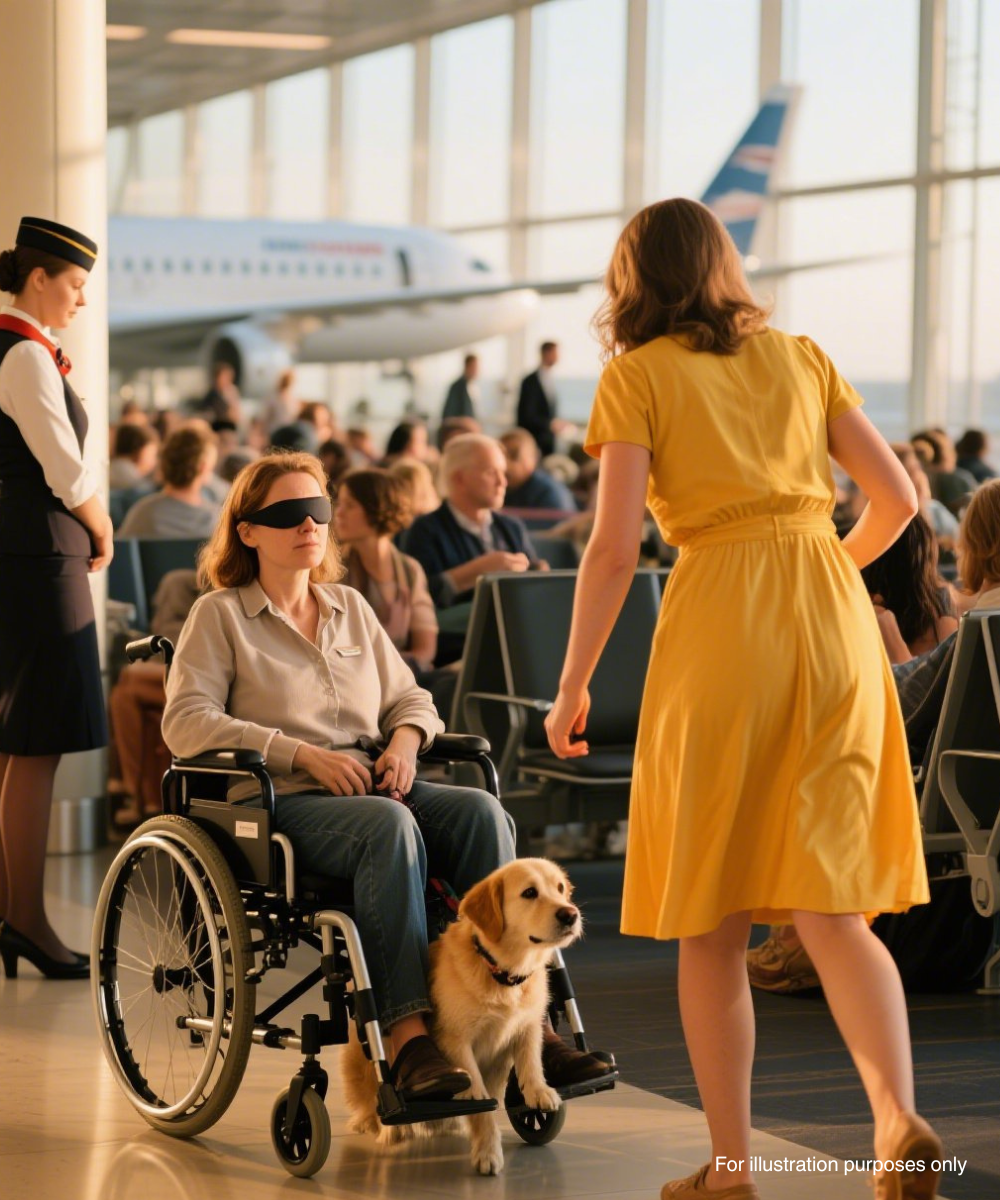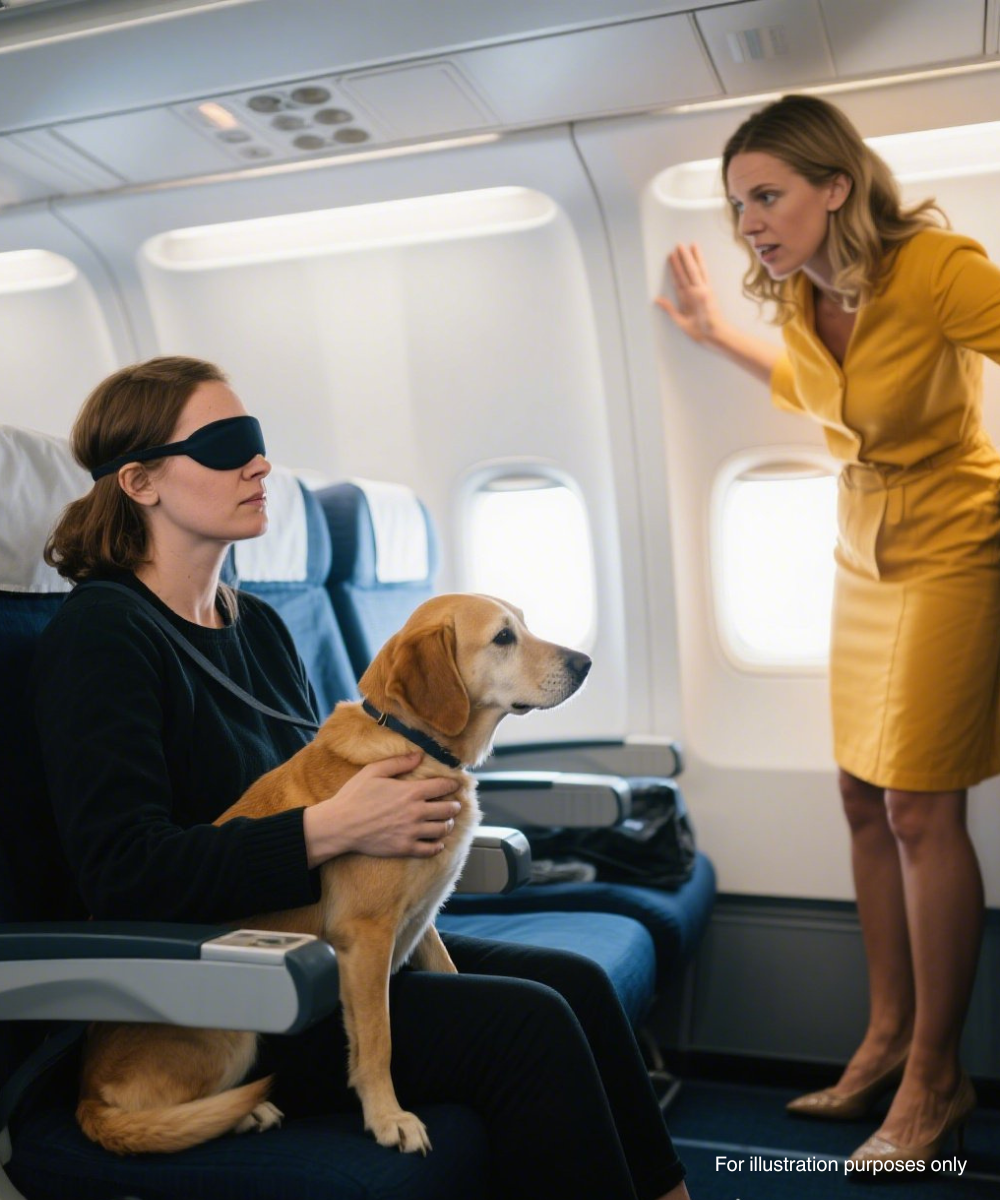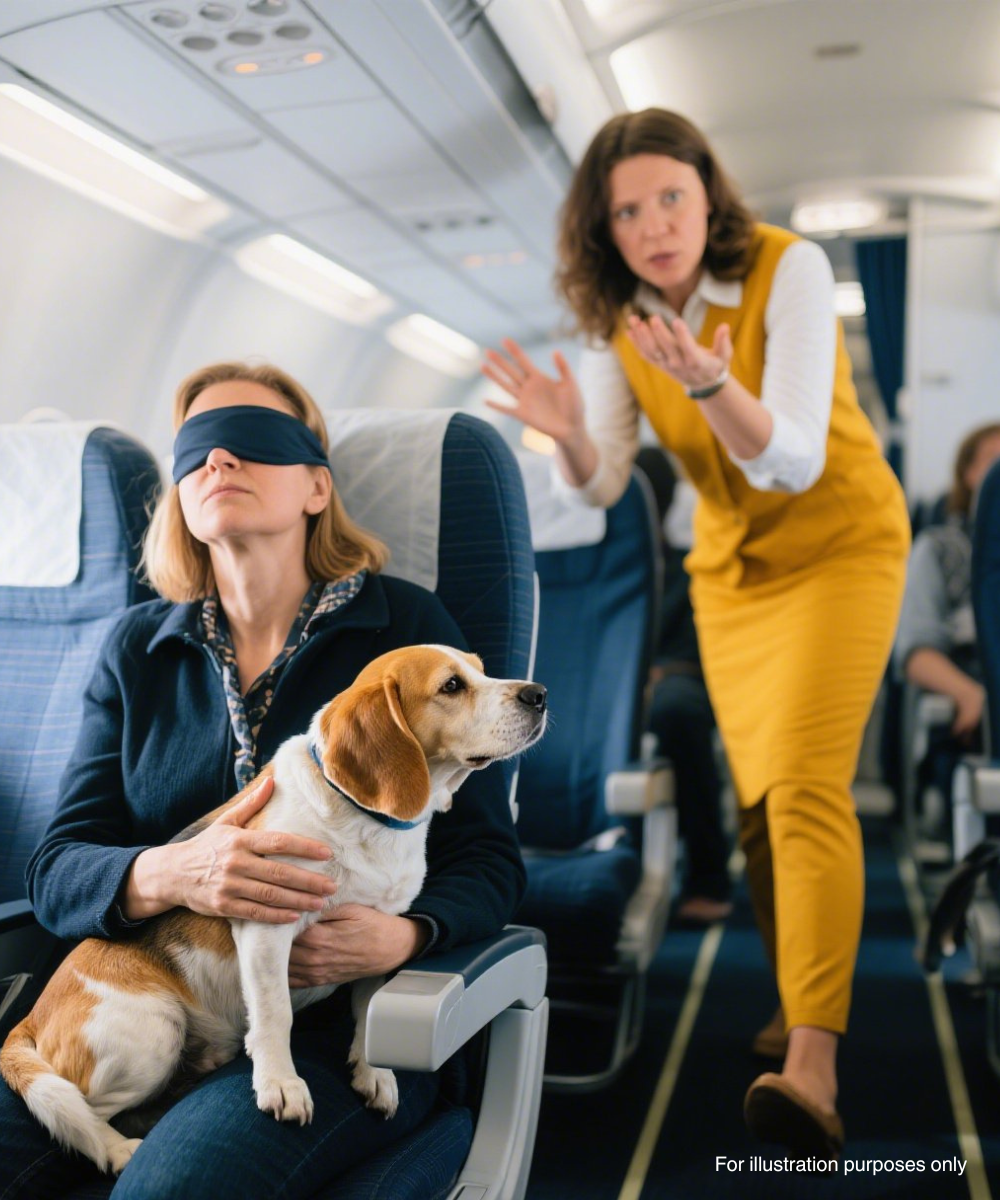It was an early, chilly morning in Dallas when Emma Carter arrived at the airport with her service dog, Max, faithfully at her side. She was on her way to Portland to visit her mother, who was recovering from knee surgery. The trip was important, but traveling always brought anxiety—and for Emma, it wasn’t just nerves. She lived with PTSD, the remnants of a trauma she rarely spoke of.
That’s why Max was with her.
Max wasn’t just a dog. He was trained to recognize the earliest signs of her panic attacks, to ground her, to steady her when the world around her started to spin. He wore a blue vest and walked calmly, matching her pace as they moved through check-in, security, and finally to the gate.
Emma had booked a seat in the second row—extra legroom, space for Max to lie at her feet. They boarded early, thanks to a service-animal accommodation, and everything seemed smooth. For a moment, Emma let herself breathe.
Until she arrived.
A woman in her fifties—heels clicking, sunglasses still on indoors, a designer suitcase in tow—stopped in the aisle beside Emma and frowned.
“Oh no,” the woman said loudly. “Is that a dog?”
Emma glanced up. “Yes, ma’am. This is Max. He’s my service dog.”
“You’ve got to be kidding me,” the woman scoffed. “I’m not sitting next to a dog.”
Emma’s heart rate ticked up. She stayed calm. “He’s trained. Completely non-disruptive. He’ll stay at my feet the entire flight.”

But logic had no place in this woman’s indignation.
“This is disgusting. What if I’m allergic? I didn’t pay for three hours of dog dander and barking.”
A flight attendant—young, composed, with a badge that read Claire—walked over. “Is there a problem here?”
The woman turned to Claire, gesturing dramatically at Max. “Yes. I don’t feel safe sitting next to this animal.”
Claire’s response was measured. “Ma’am, the passenger has proper documentation. This is a federally protected service dog.”
The woman waved her hand dismissively. “I don’t care about regulations. He could bite someone. I want her and the dog off this flight.”
Max hadn’t moved—still lying quietly at Emma’s feet. But Emma felt her breath shorten, her palms begin to sweat. Panic rolled in like thunder behind her ribs.
Claire turned gently to Emma. “Do you have Max’s paperwork?”
With shaking hands, Emma handed over Max’s ID and medical letter. Claire reviewed them, then smiled kindly.
“You’re all set. Thank you for having everything in order.”
The woman didn’t back down. “He doesn’t look like a service dog.”
“He is,” Claire replied firmly. “And you have two options: take your assigned seat, or I can find you another.”
“I shouldn’t have to move. She should,” the woman barked.
Claire didn’t flinch. “Ma’am, this passenger isn’t going anywhere. Your options remain.”
The silence was heavy.
Then, from just behind, a man’s voice broke through.
“If it helps, I’m happy to switch seats with the lady.”
A man in his forties stood in the aisle. Soft-spoken, plain clothes, warm eyes. “I’m in the same row, other side of the aisle. I don’t mind sitting next to the dog.”
The woman faltered. For a moment, it looked like she might argue—but the eyes of several other passengers were already on her. Judging. Waiting.
She muttered something under her breath, snatched up her purse, and marched away without a word of thanks.
The man took her place beside Emma, adjusting his seat with ease.

“I hope you don’t mind,” he said. “Just figured you didn’t need any more stress today.”
Emma blinked back tears. “Thank you. Truly.”
“Dogs like Max are rare,” he said, patting Max’s head gently. “It’s not the dog that’s the problem. It’s people who don’t understand what they mean.”
The plane took off. Emma felt the tension in her chest ease. Max nudged her leg gently, reminding her she was okay.
After some silence, the man introduced himself as Daniel. Somewhere over Colorado, he asked quietly, “Was Max trained for PTSD?”
Emma nodded. “He saved me,” she said. “I couldn’t go to the grocery store, let alone fly. He gave me my life back.”
Daniel smiled. “My brother had a dog like that once. Saved him, too.”
They spent the rest of the flight sharing stories—about family, about healing, about how small moments could change everything. When they landed, Daniel helped her retrieve her bag and turned to Max.
“You’re a good boy,” he said with a grin. “Take care of her.”
Emma smiled, the kind of smile that meant something. “Thanks—for everything.”
The woman who caused the scene was the first to disembark, eyes down, ignoring everyone.
But as Emma exited the plane, a few passengers smiled. One whispered, “Your dog is amazing.”
That day, Emma was reminded of a truth she’d forgotten: that kindness doesn’t always roar. Sometimes, it’s quiet. Sometimes, it takes the shape of a stranger offering a seat. Or a dog laying calmly by your feet, even when the world’s trying to shake you.

If you ever see someone with a service dog, remember: they aren’t just traveling with a pet—they’re traveling with peace, with trust, and sometimes, with the only thing making the journey possible.
And if you’re ever caught between judgment and compassion—choose compassion.
It could change someone’s entire flight… or their entire day.
